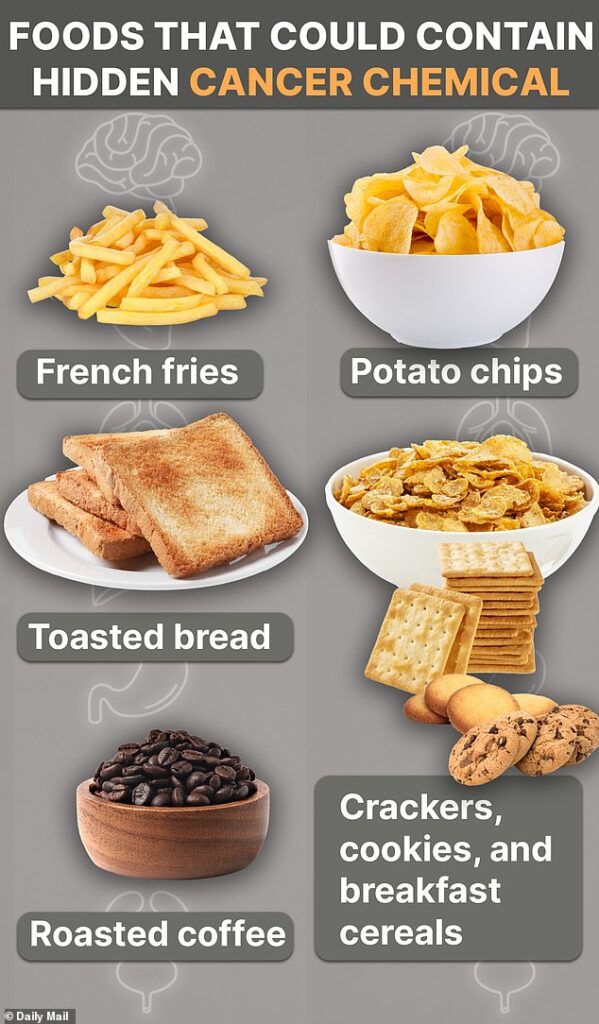[ad_1]
A hidden chemical in coffee could be raising your risk of cancer, a top longevity doctor has warned.
Acrylamide is not added to the beverage or listed on labels, but forms at high temperatures during the roasting process.
The chemical – considered a ‘probable carcinogen’ – also forms during the making of french fries, potato chips, toasted bread, crackers, cookies and breakfast cereals.
Dr. Mark Hyman, a top longevity expert from New York, urges people to drink more cold brew or dark roasts because the beans generally go through a less intense roasting process leading to the formation of less acrylamide.
Acrylamide is broken down in the body into glycidamide, a substance that can damage DNA and, according to studies in animals, raise the risk of cancer.
Modern processing techniques with their high temperatures lead to the formation of more acrylamide, particularly in fast foods – although levels in foods across the board remain very low.
The announcement comes amid a rise in colon cancers in young people, although it is not clear whether that is linked to consuming more acrylamide.
‘There’s a hidden chemical in many of your favorite crispy, crunchy, golden-brown foods, and it’s not on the label,’ Dr. Hyman said.

The above graphic shows the foods listed by the American Cancer Society that could contain acrylamide
‘Acrylamide is a byproduct of modern food processing, but it’s one we can control. Let this be your reminder today to avoid fried food.’
Acrylamide is created when refined sugars react with an amino acid called asparagine, which can be found in coffee beans, potatoes, wheat, corn and rice.
It forms when these foods are heated to around 248 F (120 C) or above – this is hotter than standard baking temperatures.
Some studies on rodents have suggested the chemical can cause tumors to form in or on the breasts, skin and lungs.
Among the studies was a 2015 paper that found rats exposed to high levels of acrylamide over two years had a higher likelihood of suffering tumors in the breasts and thyroids than those that did not receive it.
But others have found little risk of the cancer from exposure to the chemical, including when the doses are relatively low.
Studies tracking diet in humans have been equally inconclusive, with some suggesting an increased risk of cancer among those consuming more acrylamide-laced foods while others suggest it doesn’t raise risk for the disease.
Dr. Hector Perez, a bariatric surgeon at Renew Bariatrics in Mexico, told the Daily Mail that the current evidence does not support avoiding a cup of coffee because of this probable carcinogen.
‘Acrylamide is a byproduct of roasting, and, yes, it’s been linked to cancer in rodents at insanely high doses, but that doesn’t make your morning cup a hazard,’ he said.
‘In fact, moderate coffee consumption is linked to lower risks of type 2 diabetes, liver disease and mortality.

Coffee beans contain the amino acid that can react with refined sugar to form acrylamide (stock)
‘So, unless you’re drowning your coffee in sugar and cream, the bigger health risk isn’t acrylamide, it’s fear-mongering around it.’
At present, the FDA does not advise people to stop eating foods that may contain acrylamide because of the cancer risk, and says more research is needed.
Instead, it currently tells people to ensure they eat a balanced diet with low sugar consumption and plenty of fruits and vegetables.
However, eating your veggies can still expose you to more acrylamide as scientists say foods that have taken on a darker hue from cooking tend to contain more of the chemical.
Dr. Hyman – who appeared recently at a press briefing with the Trump administration, where he supported the announcement of the removal of artificial dyes from foods – raised the alarm over the potential threat on X, and also suggested ways to limit exposure to acrylamide.
This included eating golden brown instead of dark toast, boiling and steaming foods instead of frying them and avoiding refrigerated potatoes, which contain more sugar.
Dr. Hyman did not suggest that people should stop eating foods that could contain acrylamide, but instead said they should see his post as a ‘warning’ to consume fewer fried foods.
The amount of the chemical found in foods varies greatly depending on the cooking time and temperature used, but experts say that fast and processed foods tend to be the biggest dietary sources because of the high heat used to prepare them.
According to a 2021 Ethiopian study, it’s estimated that potato chips contain the most acrylamide at around 211 to 3,500 micrograms per kilogram, alongside french fries, which contain 779 to 1,299 micrograms per kilogram.
The FDA has not set limits on how much acrylamide can be present in foods, but it has released guidance on how to reduce levels.
In Europe, regulators have acknowledged the need to set an acrylamide exposure limit, but also have not taken action to date.
[ad_2]
This article was originally published by a www.dailymail.co.uk . Read the Original article here. .

